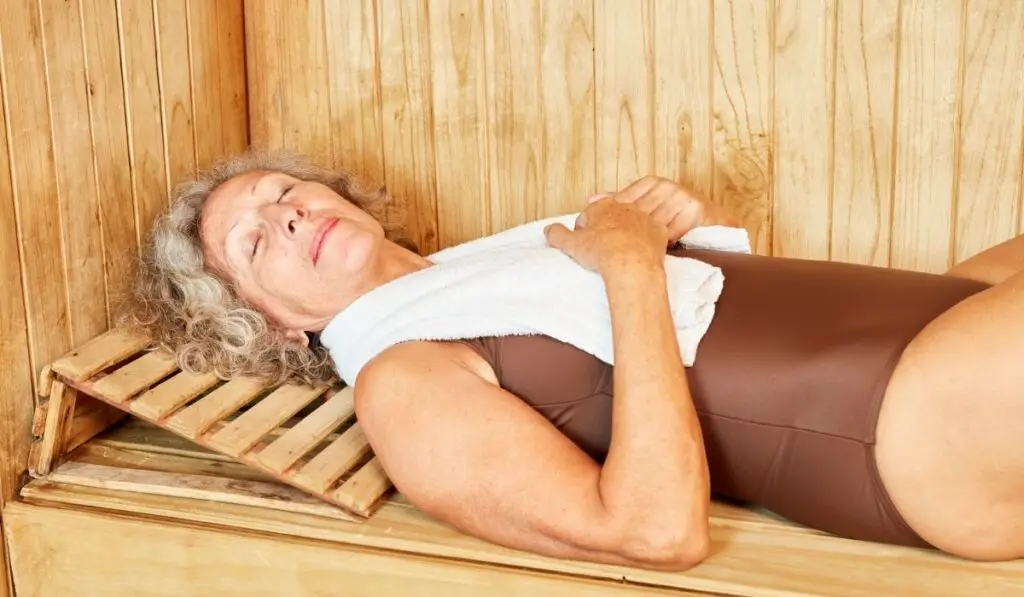It’s no secret that visiting the sauna provides you with incredible health benefits. Saunas have been used for over 2,000 years to cleanse the body and relax. Did you know they may improve sleep quality as well?
Saunas can improve sleep quality by promoting stress relief, well-being, and relaxing muscle tension. Visiting a sauna may increase endorphins, relieve some painful symptoms, and increase mindfulness. Keep your sessions closer to bedtime, no longer than 20 minutes, and drink plenty of water.
Regular visits to the sauna are just one way you can sleep better. Saunas have many health benefits and can change your life for the better, especially when paired with other healthy habits. Here’s everything you need to know about saunas and improved sleep quality.
How Does Using a Sauna Help to Improve Sleep?

It’s no secret that saunas have been linked to multiple health benefits. Saunas may indirectly improve sleep quality. Saunas have been linked to an increase in endorphins. Endorphins promote relaxation, pain relief, and a general sense of well-being. All these factors can improve sleep quality.
Sauna sessions have also been linked to improving pain and symptoms associated with diseases such as rheumatoid arthritis. Visiting the sauna can also improve symptoms of headaches and their intensity.
Another way saunas may improve sleep quality is through mindfulness. Sitting quietly in a hot sauna can give you time to clear your thoughts. Mindfulness has also been linked to better sleep and rest.
When Should I Use a Sauna to Improve Sleep?
Generally speaking, the better, the closer you can use a sauna before bed. Besides relaxation and stress relief, saunas can affect your core body temperature. Drops in core body temperature signal your body that it’s time to sleep. Wait, don’t saunas increase your body temperature?
Warming your skin up before bed can lower your body temperature. Warming your skin causes blood vessels to dilate, allowing more heat to escape and your temperature to drop faster. Using a sauna before bed puts your body in the process of cooling down beforehand.
What Happens If I Stay in the Sauna Too Long?
It can be tempting to sit in a sauna for long periods. You may feel so relaxed that you want to doze off for a short nap. Unfortunately, staying in a sauna for extended periods can have counterproductive effects and be potentially fatal.
The longer you sit in a sauna, the more likely you will experience dehydration, nausea, low blood pressure, and other adverse health complications. You may feel even more fatigued if you stay in a sauna too long.
Be sure to use a sauna for no longer than 15-20 minutes, drink plenty of water, and consult your doctor beforehand.
How Often Should I Use a Sauna to Improve Sleep?
So, how often should you use a sauna to receive the health benefits and improve your sleep quality? The answer may depend on your experience level.
Beginners shouldn’t spend more than 5-10 minutes per sauna session and only visit 3-4 times a week. You should also start on lower heat settings if you’re new to saunas. It’s best to practice caution and work your way up, even if you feel fine.
Intermediate and experienced sauna goers can increase the length of their sessions by five-minute increments at a time. Be sure to avoid sitting in a sauna for more than 15-20 minutes, even if you’re a seasoned pro.
Regardless of your experience level: If you start to feel dizzy, nauseous, or tired, step out of the sauna immediately. Find a cool place to sit down until you feel stable. Drink plenty of water, dress properly, and consult your doctor beforehand.
What Are the Best Tips for Using a Sauna to Improve Sleep?

Regular sauna sessions are only one element of improved sleep quality. Visiting the sauna may ease muscle pain, reduce stress, and improve your well-being.
However, you’ll need to pair your sauna sessions with tips, tricks, and other lifestyle changes to receive the greatest benefit.
Visit the Sauna Before Bed
You’ll want to visit the sauna a few hours before bed if you’re trying to improve your sleep quality. As mentioned earlier, stepping out of a sauna can help reduce your core body temperature, which has been linked to increased sleep quality. Try visiting the sauna 1-2 hours before you lay down for the night.
Stay Hydrated
Staying hydrated is crucial for a productive sauna session and night routine. Drink a glass of water before entering the sauna, and drink 1-4 glasses after your session. This will keep you from becoming dehydrated and experiencing negative symptoms.
Reduce Alcohol Consumption
Drinking alcohol right before visiting the sauna may seem like a good idea. Unfortunately, alcohol can increase your levels of dehydration and discomfort and decrease sleep quality.
Alcohol might make you feel sleepy, but it can decrease sleep quality from 9% to 39%. Be sure to avoid alcohol before the sauna and bedtime.
Reduce Digital Distractions
It’s common knowledge that screens and digital distractions can negatively impact sleep quality. Reducing digital distractions before and after a sauna session could improve sleep hygiene.
You might find it easier to relax and practice mindfulness if you limit screen time right before stepping into the sauna. Turning off screens and electronics at least 30 minutes before you lay down could also help you get a good night’s rest.
Daily Exercise
Daily exercise and physical activity are crucial to a healthy lifestyle. Not to mention, exercise has been linked to increased sleep quality. For example, moderate to intense aerobic exercise has been linked to improving symptoms of insomnia.
A simple 30-minute exercise session can also reduce the time it takes to fall asleep and help you stay asleep. Exercise also releases endorphins, resulting in stress relief, pain relief, and an increased sense of well-being. These factors all play a vital role in helping you fall asleep, stay asleep, and wake up feeling energized.
Be sure to exercise daily if you can. Going for moderate to intense walks can be enough to significantly impact. If you aren’t exercising during the middle of the day, try doing so one to two hours before bed. This can help your body wind down and regulate your core body temperature.


